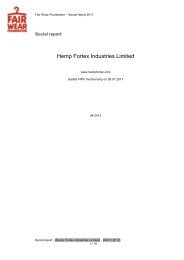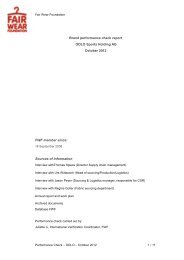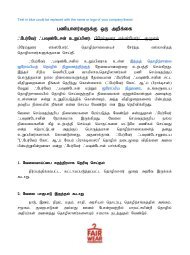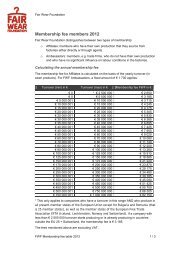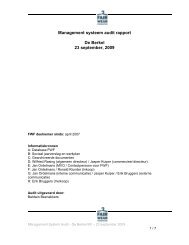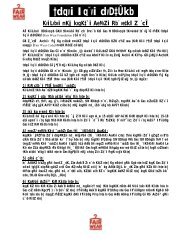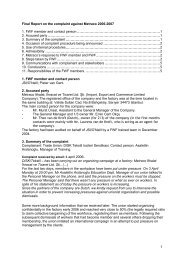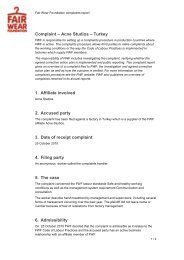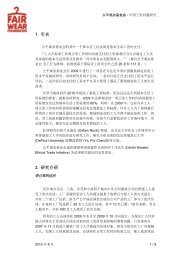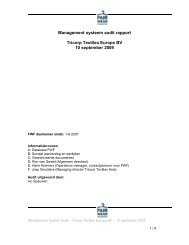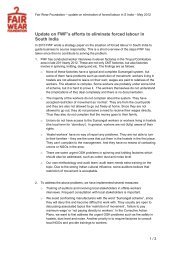Background Study Tirupur - Fair Wear Foundation
Background Study Tirupur - Fair Wear Foundation
Background Study Tirupur - Fair Wear Foundation
Create successful ePaper yourself
Turn your PDF publications into a flip-book with our unique Google optimized e-Paper software.
der the Factories Registration Act, 1948. This is how the employment<br />
lationship is to be registered.<br />
4.8.2. Compliance situation<br />
Most of the employers do not comply with the extensive laws protecting the<br />
workers’ rights.<br />
In most companies workers are sent home if the company has no work for them that day,<br />
without any payment, although the should be entitled to have 50% of their wages paid. They<br />
are most of the time not notified the day before.<br />
Companies most of the time lack appointment letters. If they are available they hardly ever<br />
mention the salary. Still many larger companies have a core of workers that work for the<br />
company for over 3-4 years.<br />
Workers seem to accept the absence of any job security as the way things are. Officially<br />
workers cannot be laid off because of lack of work without permission of the government.<br />
Workers that have been working for more than 1 year for the same company have a right to<br />
one-month period of notice and 15 days average pay for every competed year of service or<br />
any part thereof in excess of 6 months.<br />
‘The 1976 amendment to India’s ID Act (1947) makes layoff (Section 25 M), retrenchment<br />
(Section 25N), and closure (Section 250) illegal except with prior permission of the government.<br />
The permission requirements cover all industrial establishments employing<br />
100 or more workers. The penalty for layoff, retrenchment, or closure without government<br />
permission includes both a prison sentence and a fine for the employer. If an<br />
employer closes down a unit even after refusal by the government, he or she can be imprisoned<br />
for up to one year or fined up to Rs. 5,000 or both. The legislation does make an exception<br />
for retrenchment resulting from a power shortage or natural disaster.<br />
However (..), the industry has always tackled the problem in its own way, by engineering<br />
an exit. If a company becomes sick, there is not even money to pay the electricity bills, so<br />
the power is shut off. Thus, Section 25 O of the ID Act 1947 is circumvented, and the fine<br />
imposed for this violation is a paltry sum of Rs. 500 (as determined by the Gujarat High<br />
Court in 1995). When a unit is closed in this manner, workers do not get their statutory dues,<br />
such as provident fund, gratuity, current salary, leave salary, and so on. This is precisely<br />
what happened to the 50,000 workers of Ahmedabads textile industry, which was<br />
closed down because electricity was cut off for nonpayment, even though the government<br />
had not given permission to close the mills.’ (Agarwala& Khan)<br />
The Factories act and the TN Factories rules give clear indications for the kind of records<br />
that has to be kept. But many companies lack a lot of these required records. During audits it<br />
is often found that they had only very recently started keeping them. Thus for instance the<br />
period of service is not adequately recorded.<br />
Even registered companies lack time cards and pay slips, officially registered Standing Orders,<br />
a full register of adult workers (as required by the FA art. 62). One company had the<br />
general policy only to start keeping records after a worker had finished 1 year of employment<br />
other companies may lack any records of temporary workers, workers on probation, apprentices,<br />
etc.<br />
Attendance registers do exist but are often not signed. The company fills it in.<br />
Time records keeping are maintained separately.<br />
Accidents registers are maintained but always show nil. Companies are afraid to run into<br />
problems with the factory inspector. Some auditors ask management to maintain an informal<br />
register to at least see what is happening or what prevention measures should be taken.<br />
PF slips must be given every year. But their registration number may be different for every<br />
year. The account breaks and the worker does not have a consistent account. This also hap-<br />
43




